The Great Gatsby is, for better or worse, a product of Modernism. For people who like Modernism with all the trimmings, that’s a great thing. The novel is heavily influenced by jazz culture (in setting and story structure). Everything and nothing happens as the plot very slowly unwinds. The focus is placed heavily on style and theme over character and story though, to be fair, The Great Gatsby has more plot than many other Modernist novels. For all the raucous bootleg liquor-fueled parties and general mayhem, the story is very quiet and small in its scope and ambitions.

You can’t call Baz Lurhmann a modest director in The Great Gatsby
Baz Lurhmann is the last man I expected to adapt this Jazz Age masterpiece of American Modernism for that very reason. Lurhmann is at his best with spectacle. Sure, the simple story and heavy romantic elements make
The Great Gatsby a strong fit in his oeuvre–
Romeo & Juliet and
Moulin Rouge! aren’t exactly heavy on the narrative. It is the intimate and tender nature of the work that would most likely prove problematic; it did.
The Great Gatsby is adapted here as a quasi-memoir within a wannabe writer’s therapy sessions. Nick Carraway is a WWI veteran, a failed writer, and a new bonds trader living in a small cottage in an affluent area of Long Island. His neighbor is Jay Gatsby, a famous and wealthy man who no one ever sees even at the garish parties he throws every weekend. Nick’s cousin Daisy Buchanan married millionaire Tom Buchanan and also live in the same Long Island neighborhood. Jordan Baker, the most famous female golfer in America and a friend of Daisy’s, tells Nick all the gossip about town, including how Tom is cheating on Daisy with a mechanic’s wife. Everything changes in Nick’s life when he becomes the first person to ever receive a written invitation to one of Gatsby’s elaborate parties.
In some ways, Baz Lurhmann and Craig Pearce’s adaptation of The Great Gatsby is incredibly faithful. The scenes that move painfully slow in the book crawl onscreen. The shocking revelations and twisted series of secrets are as intriguing on film as they are on the page. Gatsby’s secret love is incredibly touching and Daisy’s life is tragic in spite of her own actions. The liberties that are taken have no bearing on the plot of the tiny thread Lurhmann and Pearce focus on.
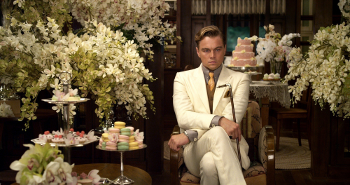
Jay Gatsby is not a subtle man by any means
However, in choosing not to pump up the story or trim away the meandering narration of this work of Modernism, Lurhmann and Pearce have crafted a screenplay that rejects the expected standards of cinema. The story moves in waves, ebbing and flowing in action and character development. Nothing will change for 30 minutes, then everything swings in a wildly different direction. It’s page-accurate to a fault.
A less extravagant director would have found a way to craft the intimacy and isolation necessary to take a literal approach to The Great Gatsby; not Baz Lurhmann. He provides spectacle in every scene even when it’s not needed. A string of pearls shoot out from the screen while Daisy recalls her wedding day with Tom. Cartoonish CGI automobiles fly down expressionist paintings of the fictional towns of East and West Egg and the valley of ashes. Every frame is so packed with details and anachronistic but thematically meaningful music that the story is never given room to breathe or even feel as hollow as it should.
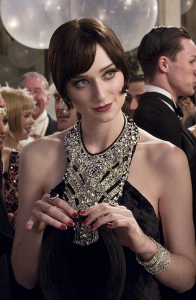
Jordan Baker is one of the more fascinating characters in the novel
While the film rightly puts focus on Leonardo DiCaprio’s masterful performance as Jay Gatsby, the next best performance is relegated to the sidelines to the determent of the adaptation. Elizabeth Debicki is stunning as Jordan Baker, the gossiping golfer and curiosity capturing America’s interest with her sporting achievements. Her physicality, her expression, and her conspiratorial whisper make every moment she has onscreen a treasure to behold.
In the novel, Jordan dates Nick Carroway for most of the story, adding a steady relationship to the potent mix of Daisy and Tom and the mistresses and fornicators. In Baz Lurhmann’s vision of the story, Jordan is discarded at the earliest possible moment with no fanfare or story of her own. It’s a big chunk of the thematic portrait of The Great Gatsby and one that is sorely missing in the over the top spectacle of mismatched partners.
The Great Gatsby is a really attractive film brought down by its own beauty and splendor. There can be an argument for the 3D spectacle of the film representing the rise and fall of Jay Gatsby, but there is nothing to indicate that in the screenplay or visual text of the film. What we’re left with is a pretty but hollow shell of an incredible novel that mimics but never fully realizes the great depth required to bring such shallow and petty characters to life.
Rating: 5/10
Thoughts on The Great Gatsby? Share them below.
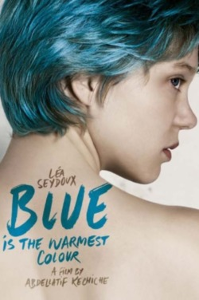 Blue is the Warmest Color is a quiet character study and romance unlocked by its title alone. Adele, a high school student focusing on literature, tries to fit in by dating the boy everyone knows she’s perfect for. She feels nothing from the relationship and winds up meeting Emma, a university fine arts student, at a lesbian bar. Emma’s bright blue hair catches her interest and helps her begin to form a sense of identity.
Blue is the Warmest Color is a quiet character study and romance unlocked by its title alone. Adele, a high school student focusing on literature, tries to fit in by dating the boy everyone knows she’s perfect for. She feels nothing from the relationship and winds up meeting Emma, a university fine arts student, at a lesbian bar. Emma’s bright blue hair catches her interest and helps her begin to form a sense of identity.



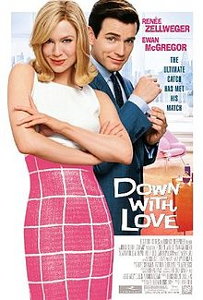 Down With Love is all about design and betraying expectations. The art direction is phenomenal. Bright pops of color and striking graphics fill every inch of the frame, establishing a visual reference for the battle of the sexes. It’s far more nuanced than the pink and the blue of Barbara and Catcher’s lives. Catcher is constantly surrounded by traditional designs and what the mainstream culture would define as hip for a bachelor. Barbara is framed in sleek minimalism and explosive touches of Mod and Beatnik counter-cultures wherever she goes. Their meetings swing back and forth between the two worlds as the balance of power shifts in the relationship.
Down With Love is all about design and betraying expectations. The art direction is phenomenal. Bright pops of color and striking graphics fill every inch of the frame, establishing a visual reference for the battle of the sexes. It’s far more nuanced than the pink and the blue of Barbara and Catcher’s lives. Catcher is constantly surrounded by traditional designs and what the mainstream culture would define as hip for a bachelor. Barbara is framed in sleek minimalism and explosive touches of Mod and Beatnik counter-cultures wherever she goes. Their meetings swing back and forth between the two worlds as the balance of power shifts in the relationship.
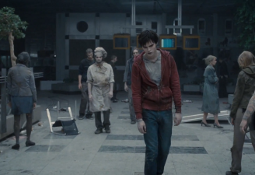
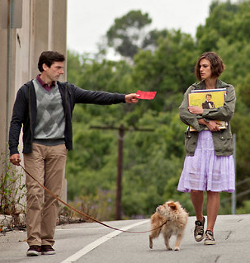 Dodge (Steve Carell) learns the world will end in three weeks due to a cataclysmic asteroid collision with earth. As soon as the radio story ends, Dodge’s wife flees the car and never comes back home. The world is ending and no one wants to waste their time being with anyone or doing anything they don’t want to except for Dodge. He goes to work, pays his housekeeper, and tries to make the most of the world ending. Then Penny (Keira Knightley) climbs outside of his window on the fire escape and quickly befriends him after years of never talking in their apartment complex.
Dodge (Steve Carell) learns the world will end in three weeks due to a cataclysmic asteroid collision with earth. As soon as the radio story ends, Dodge’s wife flees the car and never comes back home. The world is ending and no one wants to waste their time being with anyone or doing anything they don’t want to except for Dodge. He goes to work, pays his housekeeper, and tries to make the most of the world ending. Then Penny (Keira Knightley) climbs outside of his window on the fire escape and quickly befriends him after years of never talking in their apartment complex.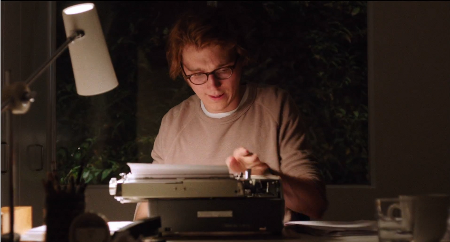

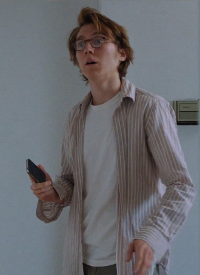

 Honestly, the biggest problem with this adaptation of Anna Karenina is that the sets aren’t artificial enough. You can’t go from plywood cutouts, unpainted on the back, to lush landscapes rolling into the far distance. When you choose a conceit like a play on film to visually break up the levels of society, you need to commit or dump it. You can’t have fake trees and a painted flat in one scene and an actual forest in the next without pulling the film apart.
Honestly, the biggest problem with this adaptation of Anna Karenina is that the sets aren’t artificial enough. You can’t go from plywood cutouts, unpainted on the back, to lush landscapes rolling into the far distance. When you choose a conceit like a play on film to visually break up the levels of society, you need to commit or dump it. You can’t have fake trees and a painted flat in one scene and an actual forest in the next without pulling the film apart. The acting is as strong as it can be in this kind of film. There are actions taken that even Keira Knightley and Jude Law can’t force into a believable response because Tolstoy himself did not make them believable. These are awkward moments designed solely to push the story in new directions and the cast makes them as believable as possible. You can only push soap opera histrionics so far before alienating the audience. The entire ensemble finds the truth of this adaptation and makes you care deeply for their plight.
The acting is as strong as it can be in this kind of film. There are actions taken that even Keira Knightley and Jude Law can’t force into a believable response because Tolstoy himself did not make them believable. These are awkward moments designed solely to push the story in new directions and the cast makes them as believable as possible. You can only push soap opera histrionics so far before alienating the audience. The entire ensemble finds the truth of this adaptation and makes you care deeply for their plight.

